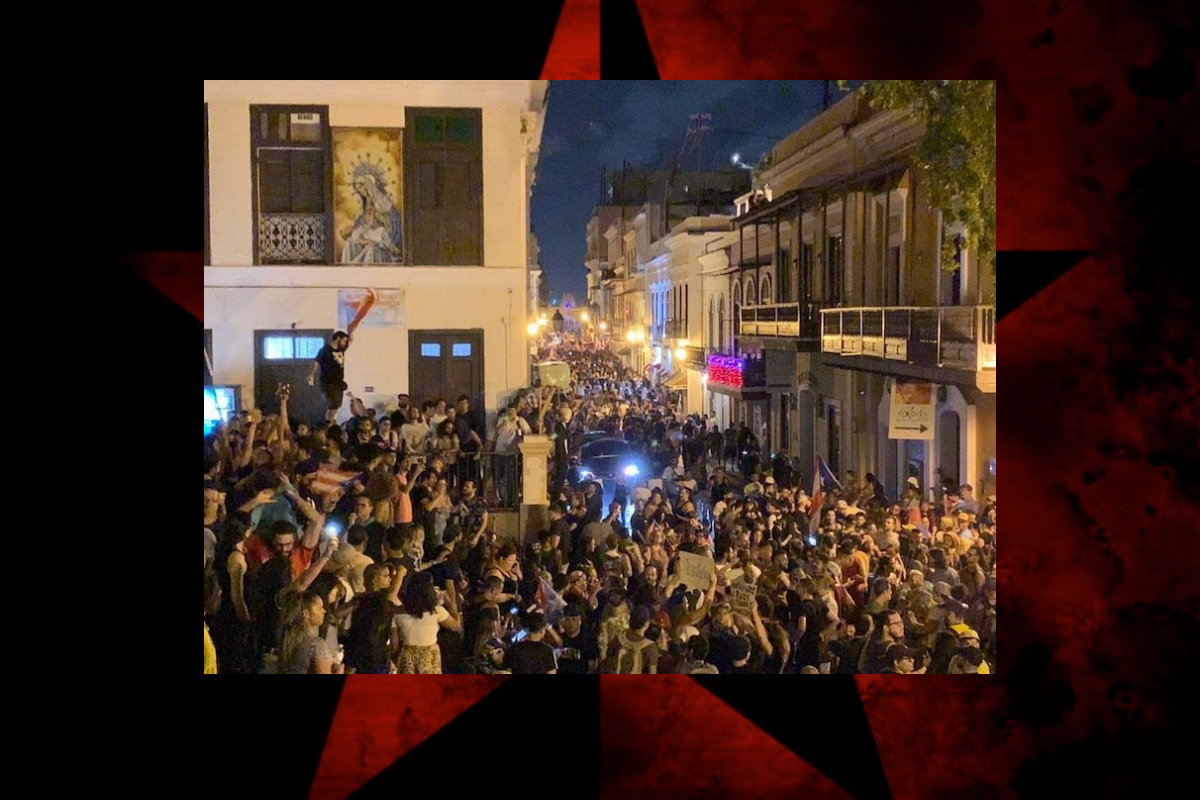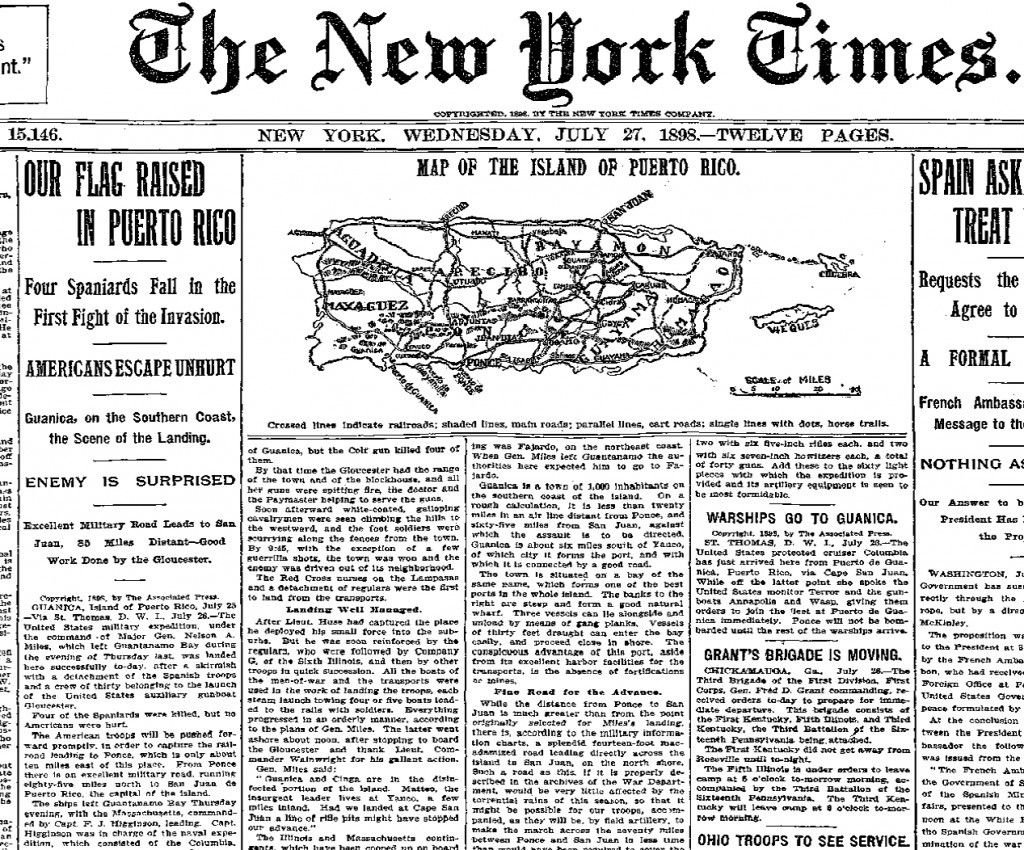

Old San Juan, Puerto Rico, during the late hours of July 24, 2019. The celebration continued into the early hours of July 25, 2019. (Photo by Latino Rebels)
On July 25 of 1898, soldiers from the United States Army, supported by the Navy and a group of Puerto Ricans in exile, landed in Guánica, initiating the campaign that would see Puerto Rico transition from a Spanish colony with airs of autonomous province to an American one longing for political and cultural determination. The group of Puerto Rican exiles who landed with the invading American force thought that the Yankee sword would break the Jordanian knot of Spanish colonialism that for so long had hurt Puerto Rico, and that so many times had betrayed and violated the promises of reform made under duress or during one of its abortive liberal periods. Hence, many Puerto Ricans took their chances believing that the “Empire of Liberty” would extend to their beloved Puerto Rico. In reality, the 25th of July became another reminder, another marker of more unfulfilled promises.


After the American invasion, the surrender of the Spanish forces, and the transfer of sovereignty under the stipulations of the Treaty of Paris, a provisional military government runs the archipelago until 1900, when the Foraker Act inaugurates the first civilian government in Puerto Rico under American sovereignty. At the dawn of the 20th century, Puerto Rico continued as a colony under the “tutelage” of the American Empire, represented by Uncle Sam as the epitome of Anglo-Saxonism and white supremacy.
There would be more unfulfilled promises. For example, the Jones Act of 1917, which extended U.S. citizenship to the people of Puerto Rico (a colonial citizenship), did little, if anything at all, to put us on the path towards decolonization or self-determination, and further complicated the colonial relationship.
Meanwhile, July 25 continued to be celebrated in Puerto Rico as “Liberation Day” while many voices asked: What liberation, if we continue without self-determination or self-government? Those voices became louder and louder and the military parades culminating the festivities of July 25 became, at least for many sectors of Puerto Rican society, reminders of an invasion under the false promise of liberation, and an insult to Puerto Rico.
On July 25, 1938, the celebration became an outright provocation when the hated governor Blanton Winship moved that year’s celebration from Guánica to Ponce. All this, a little more over a year after the Ponce Massacre of March 21, 1937. The nationalists responded to the insult, attempting to assassinate Winship during the parade, which left one dead and 32 wounded—all of them Puerto Ricans. More repression was in store for the people of Puerto Rico.
After such a dark episode, July 25 could no longer have the meaning of liberation that the invader and those who continued to follow him (either because they naively still believed in the promise of liberation or because they couldn’t envision a future without it) wanted to give it.
Another July 25
But there is another July 25, the one I grew up with. This is the one that celebrates the constitution of the Estado Libre Asociado (poorly translated as the Commonwealth of Puerto Rico). It is no coincidence that July 25 is chosen to inaugurate the new constitution of the reformed colonial state. It is an attempt to erase 54 years of American colonialism and false promises. It is an attempt to start anew and retaking, in fact rebranding, that day to begin building a Puerto Rico that responds to the needs of its people, a people that has been making patria for a long time despite false promises.
The ELA didn’t fail because we didn’t try to make it work. The people of Puerto Rico put their hearts and souls into making it work. Its first leaders and the technocrats of the new reformed colonial state threw everything in it—the Puerto Rican peasant turned engineer, electrician or even soldier gave everything they had for their families, communities, and country. And they worked miracles. For a while they made it work —social and economic advancement, first class infrastructure— hope of a new Puerto Rico and a buoyant self-esteem were all part of that of that effort.
But there was one problem, Puerto Rico continued to be a colony. “Colony light,” as the joke went when I was a kid in the public schools of the country, but a colony nonetheless. And the promises of the ELA, of that new July 25, no matter how much we tried, couldn’t be realized.
Not surprising, it is the fiscal board imposed on Puerto Rico by the United States Congress and under the insulting acronym “PROMESA” or promise—which makes impossible to hide that the ELA can’t possible go any further, that its promises can’t be fulfilled, that Puerto Rico is not sovereign in any way.
And here we are, the day after July 25, 2019, 121 years after the invasion that promised freedom and the end of our colonial condition. We are still under the colonial yoke, now almost completely under the control of the local elites—our own colonial agents. But the people have awakened, the people are standing up, empowered, united. The people are tired of promises and taking action without parallel or precedent in our history. That is obvious in the pictures and videos doing the rounds in social and mainstream media. We see it with strangers on the street, in offices, in the grocery store, in la plaza. What is happening in Puerto Rico is a true Revolution in the full meaning of the word.
It is spontaneous. It unites the most diverse groups. It breaks generational gaps and political and ideological divisions, and transcends gender, racial and even class barriers.
This July 25 found the people of Puerto Rico united like never before. It was never just about demanding that governor Ricky Roselló resigned—that was too little. As I write this, the people of Puerto Rico are already celebrating his resignation and one thing is clear: the protests were about a new Puerto Rico, one that is for all of us and by all of us.
But it is no longer necessary to demand it.
For whatever happens. that much has been accomplished. Puerto Rico is not going back to the two-party system that has caused so much damage. It is not going back to the rampant corruption of governments interested in lining the pockets of their supporters and families and perpetuating themselves in power. The game, the whole system has been changed by the people. This is what the hundreds of thousands taking to the streets and the millions supporting them from the countryside, the valleys, the beaches, the Diaspora, and from la Luna, have accomplished thus far.
Here is to this July 25, 2019 being the beginning of a new Puerto Rico. A Puerto Rico for all, one that does not need promises because it is now the people who are in charge of building it.
***
Harry Franqui-Rivera is an Associate Professor of History at Bloomfield College. He is the author of Soldiers of the Nation: Military Service and Modern Puerto Rico, 1868-1952 (Studies in War, Society, and the Military Series) University of Nebraska Press, 2018.


